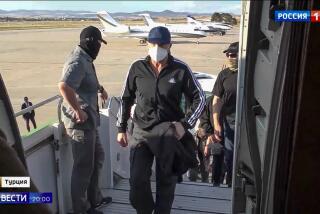Shcharansky Freed, Gets Warm Welcome in Israel : 8 Others Released in Swap
- Share via
Anatoly Shcharansky, the Soviet human rights activist who was imprisoned as a spy, crossed a snowy German bridge to freedom today and flew to Israel, the spiritual homeland he had never seen.
The East-West prisoner exchange on Berlin’s Glienicke Bridge also included five alleged Soviet Bloc spies traded for three Westerners held in the East.
Prime Minister Shimon Peres and Foreign Minister Yitzhak Shamir warmly embraced Shcharansky in a welcoming ceremony at Tel Aviv’s Ben-Gurion Airport that was broadcast live on radio and television.
“How are you?” Peres asked. “Everything is OK,” was the response from Shcharansky, a dissident Soviet Jew who spent nine years in prison and labor camps. Both spoke in Hebrew.
Held Hands With Wife
Shcharansky clenched his hands over his head in a sign of victory, then held hands with his wife, Avital, who lives in Israel and had spent more than a decade working for his freedom.
Shcharansky went into the airport terminal with Peres and they telephoned President Reagan.
“We thanked him for his tireless efforts out of a deep feeling for the Jewish people and an inner conviction that the Jewish people deserve to leave the Soviet Union,” Peres said.
The 45-minute exchange was the latest of several prisoner swaps on the Glienicke Bridge, a green metal structure that spans the Havel River between West Berlin and Potsdam in communist East Germany.
Freed First
Shcharansky was freed first. Both the dissident and the U.S. government insist he was not a spy, and American officials said they demanded he be freed before the others to emphasize that.
A Soviet court convicted him of spying for the CIA and he was sentenced to 13 years imprisonment in 1978.
Snow was falling as Shcharansky crossed, wearing a fur hat and a broad smile. U.S. officials said he did not speak of his future plans and did not complain of health problems, although reports had indicated that his health suffered during his time in prison and labor camp.
He was met by Richard R. Burt, the U.S. ambassador to West Germany, and they shook hands at 10:57 a.m. on the span West Germans call the “bridge of spies.” Burt towered over Shcharansky, a small, balding man of 38 who is a computer expert and mathematician.
It was 25 degrees, in an icy river wind, as Burt guided the smaller man to a waiting Mercedes limousine. The two then sped away with a police escort to Tempelhof airport in West Berlin.
Israeli Jet Well-Guarded
In Frankfurt, five West German policemen armed with submachine guns ringed the Israeli government executive jet that awaited the Shcharanskys.
Avital Shcharansky, 34, arrived in Frankfurt only two hours before her husband. She left the Soviet Union soon after their marriage in 1975, with the understanding that he soon would follow, and began her worldwide campaign when the Kremlin refused to let him go.
In Israel, at a reception after their arrival, Peres said of Shcharansky: “You can arrest a body, but you cannot imprison a spirit,” adding that Avital Shcharansky “fought like a lioness” in her long struggle for his freedom.
A U.S. official in Berlin identified the other prisoners freed from the East as Wolf George Frohn of East Germany, Jaroslav Jaworski of Czechoslovakia and Dietrich Nistroy, a West German, all held in East Germany.
He said those sent East were Jerzy Kaczmarek of Poland, Yevgeni Semliakov of the Soviet Union, Detlev Scharfenort of East Germany and Karl F. Koecher and his wife, Hana, of Czechoslovakia.
More to Read
Sign up for Essential California
The most important California stories and recommendations in your inbox every morning.
You may occasionally receive promotional content from the Los Angeles Times.










